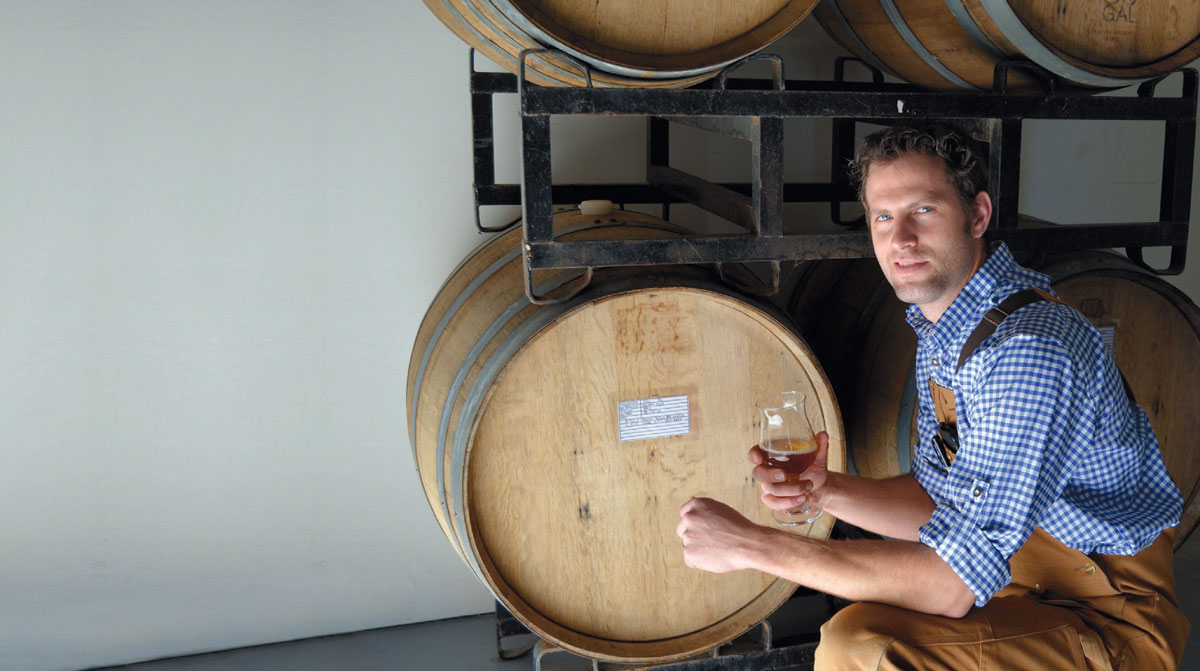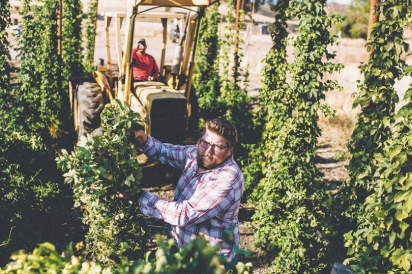There’s Something in My Beer
Brewers use locally sourced ingredients to embellish craft beers
Smoky habanero porter, tart peach saison, smooth hazelnut milk stout, citrusy IPA: This is the new spectrum of beer flavor in Ventura County. As the number of national microbreweries grows, and popular regional brands expand their territory and lineup, local breweries up the ante by adding nontraditional, locally sourced brewing ingredients—like fruits, vegetables, coffee and nuts—to their recipes.
In doing so, local brewers build their community and differentiate their product. They effectively produce beers with a sense of place.
And they’re tapping into a growing trend. “In IPAs, the fruit/veggie/ spiced sub-style is one of the fastest growing,” says Bart Watson, PhD, chief economist for the Brewers Association. “Coffee beers were the fourth most entered category at the Great American Beer Festival [in 2016],” he adds.
Adding coffee beans to a brew imparts powerful roasty aromatics, but whole beans can also contribute slight bitterness and acidity to the brew.
At Institution Ale Company in Camarillo, co-owner and head brewer Ryan Smith releases a variety of beers, among them multiple selections incorporating roasted coffee beans from Beacon Coffee, with locations in Ventura and Ojai, including Frantic Coffee Oatmeal Stout with oak and Sanity Imperial Coffee Stout.
A 15-barrel brewhouse, Institution Ale experiments with recipes by using its three-barrel fermenter. “Inspiration comes from all over,” says Shaun Smith, co-owner. “It could be food or travel, other non-beer drinks—wine, spirits, juices, etc.—or another beer we tried from other breweries.”
Flavor profiles need to be cohesive, so the brewing team ensures all components balance. Starting with the right style is paramount when developing a beer with dimensional flavor. “With all our recipes, we make sure that adjuncts—fruit/spice—complement the base beer [malt and hop profile]. Some ingredients, like peppers, play well with hops and we can make both flavors come through aggressively,” says Shaun Smith. They released The Flue this winter, a smoked porter with habaneros.
Natural hop bitterness can clash with the heat of chilies, so brewers weigh the advantages of different hop varieties and determine whether or not to use the seeds of the chili, which are more tannic than the flesh.
Head to Moorpark and you’ll find Enegren Brewing Company in a business park off Spring Road. Since 2011, Enegren has focused its lineup on clean German-style ales and lagers. In 2016, they brewed their first collaboration beer, a barrel-aged saison with peaches, from fruit grown at Apricot Lane Farms’ nearby orchards.
Members of the Enegren team picked peaches at the farm, puréed them, and added three liters of peach purée per wine barrel that they used for aging. To increase the complexity of the beer, they added Brettanomyces to these barrels, a wild yeast known for delivering a “funky” aroma and sour flavor when combined with bacteria. The beer will be ready this spring.
It’s the first of many collaborations with Apricot Lane Farms, says head brewer Chris Enegren. Bringing the farm-beer connection to fruition, the two businesses will work together to build a farm-to-table restaurant and sour ale brewery expected to open in 2018, Enegren adds.
Some breweries prefer a minimalist path, but still flirt with additional ingredients.
Ventura’s Topa Topa Brewing Company plans to make Farmer’s Friend again this spring, says co-founder Jack Dyer. The beer, a traditional saison made with Ojai Pixie tangerines from Friend’s Ranches in Ojai, made its debut at the brewery’s first anniversary party in 2016.
At Poseidon Brewing Co. in Ventura, the popular Bubblehead Blood Orange Pale Ale will be available this spring. For summer, they’ll offer Washed Ashore Blonde Ale brewed with fresh watermelon juice and Underway Tropical IPA with pineapple and coconut.
Institution also uses the unusual beer ingredient of coconut. Typically, unsweetened shaved coconut is lightly toasted before it goes into the beer, says Shaun Smith.
Sourcing produce in quantities large enough for a batch of beer can sometimes present challenges for brewers. Not so at Smoke Mountain Brewery, a subscription-based brewing company perched atop Rincon Mountain. With this unorthodox setup, subscribers receive a quarterly shipment of three bottles of beer incorporating estate-grown ingredients whenever possible. Because quantity is limited, co-founder Edward Darren Siple has full creative license to push the envelope on flavor.
Siple, a self-professed “winemaking brewer,” uses estate-grown macadamia nuts in Smoke Mountain’s Milk Stout. Blood oranges, navel oranges and tangerines from their property go into their winter and spring White Ale Citrus Melody. Spring also brings around their flagship Honey Lavender Blonde, where the flavor additions and hops are from their farm.
Newcomer Ojai Valley Brewery also brews with estate ingredients. At Azu Restaurant & Bar, brewery president and lead brewer Jeremy Haffner pours botanical beers like White Pixie wheat ale with citrus and citrus blossoms from his ranch and Arbolada Schwarzbier with Mexican vanilla beans.
Haffner has one beer in his lineup from a series that resonates with Southern California noses: a dry, earthy ale brewed with wild sage. “Our Chaparral Series is sort of the impetus behind the entirety of what we’re doing,” says Haffner, who works with local naturalists to forage ingredients and propagates select wild varieties on his property.
This iteration uses fresh white salvia leaves and white and purple sage in the boil, bringing a resinous backbone to the beer, along with the distinctive aromatics of the plant. Future batches will incorporate seasonal sagebrush and mugwort, yerba santa and sumac, he says.
When it comes to use of ingredients, Haffner says, “American craft beer is really the only beverage that has nothing to do with where it’s from—though there are some brewers working to change that.” In Ventura County, that reality is already happening.







